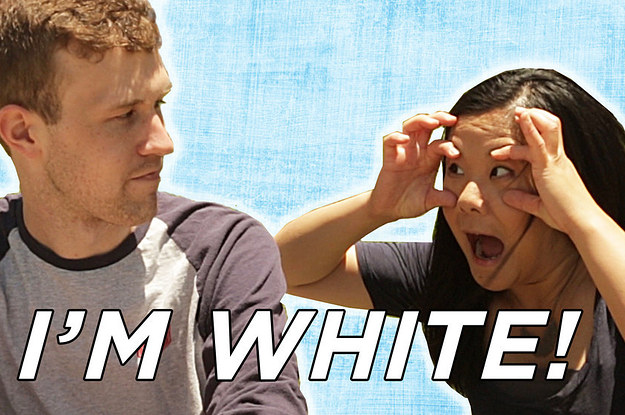Caucasian People
Every once in a while, on one of those head-numbingly formulaic police procedurals on TV, you'll hear a description of a suspect that seems pulled right from the 1950s.
Improperly use slang terms. There is nothing more annoying than when white people. The term ‘Caucasian’ is a general physical type, used to refer to the people belonging from different parts of the world. The Caucasian race consists of North Africans, Arabs, Whites, Somalians, Ethiopians and some people of India as well. Also, this term was used in an anthropological sense, without any reference to skin tone. The term ‘Caucasian’ is a general physical type, used to refer to the people belonging from different parts of the world. The Caucasian race consists of North Africans, Arabs, Whites, Somalians, Ethiopians and some people of India as well. Also, this term was used in an anthropological sense, without any reference to skin tone.
'The suspect is a 6-foot, 180-pound Caucasian male, white T-shirt, jeans ...'
Caucasian? Really? What does that even mean anymore? What did it ever mean?
It's easy, of course, to equate 'Caucasian' with 'white.' But that one word — Caucasian — touches on issues much deeper than skin color. It kindles questions of race and the very origin of humans. It even exposes the topic of whether race exists outside our curious, sometimes devious minds.
Spoiler: In humans, no genetic basis exists to separate our species into races. So if you're thinking the 'Caucasian race,' think again.
Caucasian People Wiki
Advertisement
Advertisement
What Is a Caucasian?
'There's no scientific justification for use of that term,' Joseph Graves, a professor of nanoengineering and the interim dean at the Joint School of Nanoscience and Nanoengineering in Greensboro, North Carolina, says. '[Caucasian] is actually a 19th-century anthropological idea that was based around a false conception that the origin of the human species was in the Caucasus Mountains.'
The Caucasus Mountains run from the Black Sea (to the west) to the Caspian Sea (on the East) in an area that is considered by many as the crossroads between Eastern Europe and Western Asia. The ranges — two of them, the Greater and Lesser — are due east of Italy (across the Mediterranean, much of Eastern Europe and the Black Sea), due north of Iraq (through a few countries) and due west of India (through a few countries and across the Caspian). The southern tip of Russia lies to the north of the Caucasus Mountains. To the immediate south is Georgia, a former Soviet Republic. This is where Caucasians — true Caucasians — call home. People from Georgia, Russia, Azerbaijan and Armenia hail from the area.
But Caucasians, as first identified by German anthropologist Johann Friedrich Blumenbach and as some still think of the group today, lay claim to a lot more real estate than that.
In 1795, in the third edition of his book titled 'De generis humani varietate nativa' (or, 'On the natural varieties of mankind'), Blumenbach, building on work by Swedish scientist Carolus Linnaeus and others, used the word 'Caucasian' to describe one of his five races of man. He determined each through scientific methods like the measuring of skulls, and tied each to distinct geographic regions. Caucasians were, as Blumenbach presented them, the 'white' race and included people not only from the Caucasus region, but also those from Europe, northern India and parts of Northern Africa.
(The other groups Blumenbach identified, tied loosely to skin color, were Malaysian, Ethiopian, [Native] American and Mongolian. Years after Blumenbach, scientists found that the earliest humans didn't come from the Caucasus but from Africa, in modern day Ethiopia.)
Though Blumenbach found that the 'many varieties of man as are at present known to [be] one and the same species,' his work nonetheless was seen as giving scientific credence to the concept of biological race. Over the years, that notion has been abused in order to separate groups of people (often by skin color) and to declare, through some bastardization of science, the superiority of one race over others.
Advertisement
Advertisement
The Problem with 'Caucasian'
Classifying humans into races, whatever Blumenbach's intentions, continues today. The term 'Caucasian' is still rolled out occasionally, and not only on bad TV police dramas.
'I was just at a conference here in Minnesota where a researcher from South Africa kept referring to herself and others in her country as 'Caucasians,' Graves says. 'I think it is very, very much a white supremacist, racist ideology.
'I think it has to do with Eurocentric racial ideology. People wish to hold onto the special designation exemplified by this term, 'Caucasian.'
Beyond Caucasian, the U.S. Census Bureau has its own definition of race — 'a person's self-identification with one or more social groups' — and asks respondents to choose from its own categories: 'White, Black or African American, Asian, American Indian and Alaska Native, Native Hawaiian and Other Pacific Islander.' The Census allows those surveyed to choose 'some other race,' too.
The Census Bureau's definition of race — that it's self-identified, and based on social groups — is different than Blumenbach's in that it is notably unscientific. And it supports the now widely accepted finding that race is not something that is supported by science. Genetically speaking, someone can't be of the White Race, or the Caucasian race. People aren't of the Mongolian race. They are of one species. According to the National Human Genome Research Institute, humans are 99.9 percent identical in genetic makeup.
Gordon Hodson, a professor of psychology at Canada's Brock University, explains in Psychology Today:
Advertisement
Advertisement
The Future of 'Caucasian'?
In 2013, The New York Times asked 'Has 'Caucasian' Lost Its Meaning?' Yet the term, despite its problems, has proven stubbornly resilient. 'If you want to show that you're being dispassionate,' historian Nell Irvin Painter, the author of 'The History of White People,' told The Times, 'then you use the more scientific term Caucasian.'
Still, if it's being used in an attempt to show some genetic difference between humans, a well-defined race, it's clear that the term 'Caucasian' belongs on history's scientific scrap heap.
In 2004, Graves wrote 'The Race Myth: Why We Pretend Race Exists in America.' From the introduction:
Advertisement
Also found in: Thesaurus, Medical, Acronyms, Idioms, Encyclopedia, Wikipedia.
Cau·ca·sian
(kô-kā′zhən, -kăzh′ən)adj.1.Caucasian
(kɔːˈkeɪzɪən; -ʒənCaucasian People
) orCaucasic
adjCau•ca•sian
(kɔˈkeɪ ʒən, -ʃən, -ˈkæʒ ən, -ˈkæʃ-)adj. Also, Cau•cas•ic (kɔˈkæs ɪk, -ˈkæz-)
Caucasian People Images
| Noun | 1. | Caucasian - a member of the Caucasoid race White, White person individual, mortal, person, somebody, someone, soul - a human being; 'there was too much for one person to do' Aryan - (according to Nazi doctrine) a Caucasian person of Nordic descent (and not a Jew) Caucasian race, Caucasoid race, White people, White race - a light-skinned race Circassian - a member of the Sunni Muslim people living in northwestern Caucasia paleface - (slang) a derogatory term for a white person (supposedly used by North American Indians) Semite - a member of a group of Semitic-speaking peoples of the Middle East and northern Africa Kassite, Cassite - a member of an ancient people who ruled Babylonia between 1600 and 1200 BC Elamite - a member of an ancient warlike people living in Elam east of Babylonia as early as 3000 BC white woman - a woman who is White white trash - (slang) an offensive term for White people who are impoverished WASP, white Anglo-Saxon Protestant - a white person of Anglo-Saxon ancestry who belongs to a Protestant denomination |
| 2. | Caucasian - a number of languages spoken in the Caucasus that are unrelated to languages spoken elsewhere natural language, tongue - a human written or spoken language used by a community; opposed to e.g. a computer language Chechen - a northern Caucasian language spoken by the Chechen Circassian - a northern Caucasian language spoken by the Circassian Georgian - a southern Caucasian language with 3 million speakers and a long literary tradition Ubykh - an extinct Caucasian language spoken exclusively in Turkey | |
| Adj. | 1. | Caucasian - of or relating to the geographical region of Caucasia; 'Caucasian languages' |
| 2. | Caucasian - of or relating to Caucasian people white - of or belonging to a racial group having light skin coloration; 'voting patterns within the white population' |
Caucasian
[kɔːˈkeɪzɪən]Caucasian
[kɔːˈkeɪziən kɔːˈkeɪʒən]Caucasian
Caucasian People Pictures

Want to thank TFD for its existence? Tell a friend about us, add a link to this page, or visit the webmaster's page for free fun content.
Link to this page:
